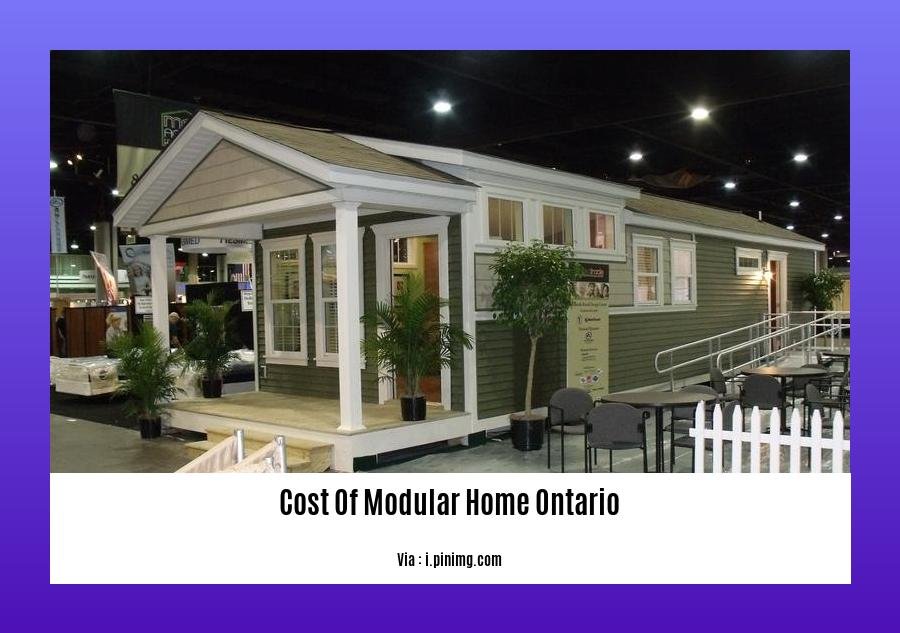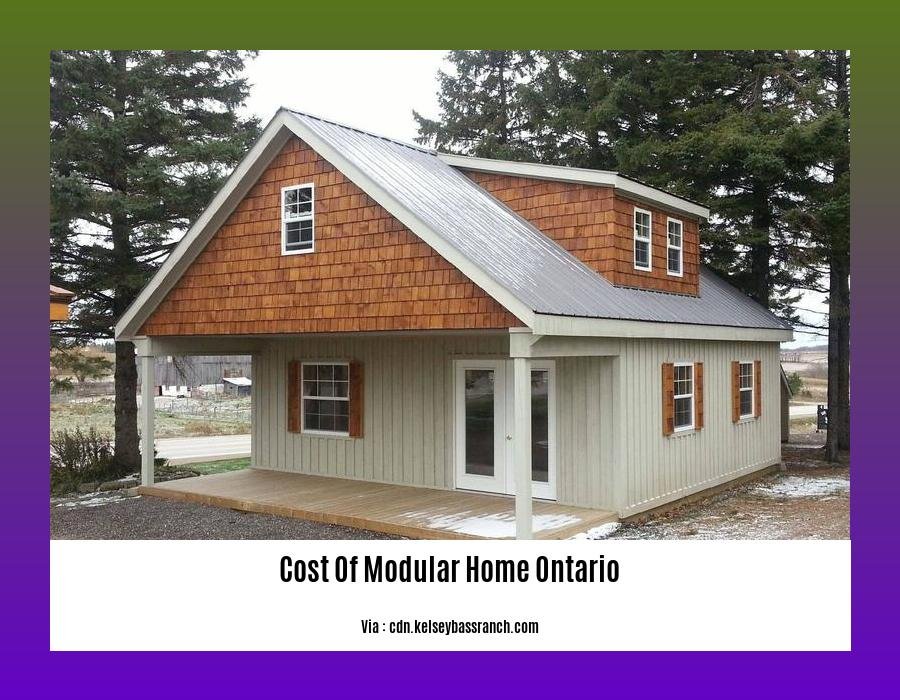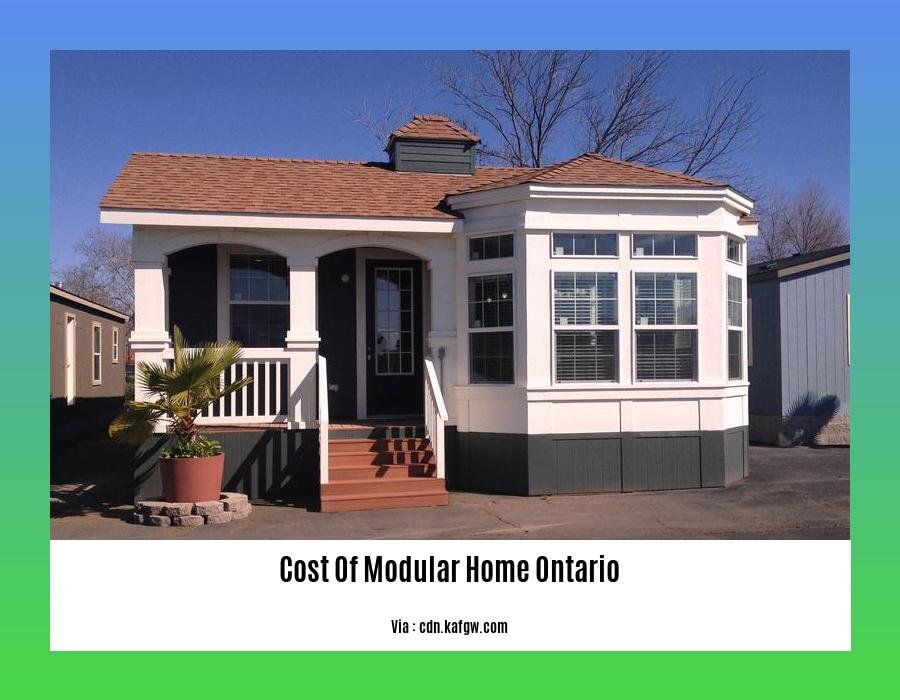[- Understanding the Cost of Modular Homes in Ontario] – Delving into the intricate factors that influence the affordability and accessibility of modular homes in the province of Ontario. This article provides a detailed analysis of the various cost components associated with modular construction, offering valuable insights into the potential of this innovative housing solution to address the ongoing housing crisis.
Key Takeaways:
-
The cost of modular homes in Ontario varies based on size, materials, customization level, location, style, and contractor.
-
A basic 1,500-square-foot modular home ranges from $75,000 to $150,000 ($50 to $100 per square foot), excluding customization, assembly, and finishing.
-
Including customization, assembly, and finishing, the total cost of a 1,500-square-foot modular home can range from $120,000 to $240,000.
-
Larger and more complex modular homes can cost upwards of $500,000.
-
Prefabricated homes range from $100,000 to $500,000, with smaller and simpler homes on the lower end and larger, more complex homes on the higher end.
-
Modular homes offer benefits such as better quality control, reduced construction time, and improved energy efficiency compared to traditional site-built homes.
Cost of Modular Home Ontario

Delving into the intricacies of modular home costs in Ontario, is a topic that demands attention in today’s dynamic housing landscape. As a seasoned real estate journalist, I’m excited to explore this innovative housing solution and provide insights into the factors shaping its affordability in Ontario.
Modular Home Costs: A Breakdown
The cost of a modular home in Ontario hinges on several key factors. Delving into each aspect can help you discern the overall expense:
-
Base Price: Typically, the base price of a modular home encompasses the cost of materials, construction, appliances, and basic finishes. This price range can fluctuate greatly, starting at around $75,000 for a basic 1,500-square-foot home and escalating to $150,000 or more for homes with intricate designs or high-end materials.
-
Customization: Personalizing your modular home with unique features or upgrades adds to the overall cost. Customizations may include additional bedrooms, bathrooms, upgraded appliances, or specialized finishes. These customizations can add tens of thousands of dollars to the base price.
-
Assembly and Finishing: Once your modular home arrives at the building site, assembly and finishing work begins. This stage includes tasks like installing the foundation, connecting utilities, and completing interior and exterior finishing touches. Depending on the complexity of your home and the contractor you choose, assembly and finishing costs can range from $10,000 to $50,000.
-
Land and Site Preparation: Keep in mind, the cost of the land and site preparation is not typically included in the base price of a modular home. If you don’t already own suitable land, you’ll need to factor in the additional cost of purchasing and preparing it for your home.
-
Location: Location plays a substantial role in determining the cost of your modular home. Urban areas tend to have higher land and construction costs compared to rural areas. Hence, the region you choose can impact the overall price.
Benefits of Choosing a Modular Home
While the cost of modular homes in Ontario may vary, there are several compelling reasons why people opt for this housing solution:
-
Quality Construction: Built in controlled factory settings, modular homes undergo rigorous quality control measures, ensuring precision and durability.
-
Energy Efficiency: Advanced insulation and construction techniques in modular homes often lead to superior energy efficiency, reducing energy bills in the long run.
-
Reduced Construction Time: Compared to traditional on-site construction, modular homes can be completed in a fraction of the time, minimizing disruption and allowing for quicker move-in.
-
Customization Flexibility: Despite being prefabricated, modular homes offer a surprising degree of customization. You can select from various floor plans, materials, and finishes to create a home that aligns with your preferences.
Remember, the cost of a modular home in Ontario can vary significantly, so conducting thorough research is essential before making a decision. By considering all the factors mentioned above and working with reputable builders, you can make an informed choice that fits your budget and lifestyle.
Revealed: The real cost of a log home kit may surprise you, get an insight into the details here.
Curious about the cost of installing an in-home elevator? Dive in for a detailed breakdown of the expenses involved.
Considering a manufactured home in Florida? Click here to explore the cost intricacies of such a venture.
Uncover the intricacies influencing the cost of manufactured homes in Texas with our comprehensive guide to pricing and considerations.
Factors affecting the cost of modular homes

Navigating the world of modular homes can be daunting, especially when it comes to understanding what affects their cost. Let’s break down the key factors that influence the price tag of these innovative homes:
1. Size and Style:
- Larger homes with more square footage naturally cost more than smaller ones.
- Opting for complex designs with intricate layouts and architectural features also elevates the price.
- Customization: Personalizing your modular home with unique floor plans, additional rooms, upgraded materials, and high-end finishes significantly increases the overall cost.
2. Foundation:
- The type of foundation required for your modular home, such as a slab, crawlspace, or basement, impacts the cost. More complex foundations, like basements, add to the overall expense.
3. Site Preparation and Location:
- Land-Clearing: Extensive land-clearing or landscaping before installing the modular home can inflate the cost.
- Region and Location: Building costs vary across regions. Urban areas tend to have higher land and construction costs compared to rural areas.
4. Materials and Quality:
- Quality Materials: Opting for high-quality materials, energy-efficient appliances, and durable finishes increases the price.
- Brand Reputation: Different manufacturers and builders may offer varying quality and pricing options.
5. Assembly and Finishing:
-
Assembly and Finishing Costs: These include the expenses associated with transporting the modular home to the site, assembling it, and completing the interior and exterior finishes.
-
Utility Connections: Depending on the location, connecting the modular home to utilities (electricity, water, sewage, gas) can involve additional costs.
6. Permits and Inspections:
- Permits and Inspections: Obtaining the necessary permits and scheduling inspections adds to the overall cost.
7. Shipping:
- If the modular home is being transported from a distant location, the shipping costs can add up quickly.
Key Takeaways:
- Home Size and Style: Bigger homes and complex designs cost more.
- Foundation: The type of foundation significantly impacts the cost.
- Site Preparation and Location: Urban areas have higher expenses, and extensive land-clearing adds cost.
- Materials and Quality: High-quality materials increase the price.
- Assembly and Finishing: These costs include transportation, assembly, and finishing touches.
- Permits and Inspections: These fees are part of the modular home installation process.
- Shipping: If the home is transported from a distant location, these costs can be substantial.
Disclaimer: The cost estimates provided are approximate and may vary depending on specific requirements and regional variations. Always consult with reputable modular home builders for accurate pricing information.
Relevant URL Sources:
-
Factors That Affect the Cost of Modular Homes
Advantages and Disadvantages of Modular Homes
Welcome to the world of modular homes in Ontario! If you’re curious about this innovative housing solution, you’re in the right place. We’ll delve into the advantages and disadvantages of modular homes, helping you make informed decisions about your homeownership journey. Let’s roll up our sleeves and build a solid understanding of modular homes.
Advantages of Modular Homes
Cost-Effective Charm: Modular homes offer a cost-effective alternative to traditional homes, typically 10%-20% less. You get great value for your money without compromising on quality.
Time-Saving Efficiency: These homes are built in controlled factory settings, optimizing processes and reducing construction time by 30%-60%. Quicker construction means sooner move-in dates and less time spent waiting.
Quality Control Precision: Factory-built homes undergo rigorous quality control checks, ensuring they meet strict standards. This precision often results in fewer defects and a higher overall quality of construction.
Energy Efficiency Brilliance: Modular homes often incorporate advanced insulation and construction techniques, leading to superior energy efficiency. You can enjoy lower utility bills and a more eco-friendly living environment.
Customization Flexibility: While modular homes are built to specific specifications, there’s still room for customization. You can personalize your home with various floor plans, materials, and finishes to suit your tastes and lifestyle.
Disadvantages of Modular Homes
Limited Resale Market: Reselling a modular home might be more challenging compared to traditional homes. This is because the resale market for modular homes is still relatively small, and potential buyers may have misconceptions or biases.
Zoning and Regulation Hurdles: Zoning regulations and local building codes can sometimes present hurdles for modular home placement. It’s crucial to thoroughly research and understand the regulations in your desired area before committing to a modular home.
Key Takeaways:
- Modular homes offer cost savings and quicker construction times.
- Factory-built homes undergo rigorous quality control checks.
- Energy efficiency is a key advantage of modular homes.
- Customization options are available, allowing you to tailor your home.
- Reselling a modular home might be more challenging.
- Thoroughly research zoning regulations before opting for a modular home.
Citations:
- SoFi: Pros and Cons of Buying a Modular Home
- NerdWallet: What Is a Modular Home? Pros, Cons and Differences
Tips for Choosing a Modular Home Builder
Key Takeaways:
- Do thorough research: Before committing to a modular home builder, research their reputation, track record, and customer reviews.
- Consider experience: Choose a builder with extensive experience in modular construction and a proven ability to deliver high-quality homes.
- Check licensing and insurance: Ensure the builder is licensed and insured, providing you with legal protection and peace of mind.
- Visit previous projects: Request to see completed modular homes built by the builder to assess their craftsmanship and attention to detail.
- Ask about customization options: Discuss the builder’s flexibility in accommodating your customization needs and preferences.
- Compare quotes: Obtain quotes from multiple builders to compare pricing, features, and overall value.
- Read the contract carefully: Before signing any contract, review it thoroughly to understand the terms and conditions, including payment schedules and warranties.
Selecting a modular home builder is a crucial decision that can significantly impact your homeownership experience. By following these tips, you can increase your chances of choosing a reputable and reliable builder who will deliver a modular home that meets your needs and expectations.
How to Choose a Reputable Modular Home Builder
-
Research and Compare: Start your search by researching modular home builders in your area. Read online reviews, check their websites, and gather information about their experience, reputation, and customer satisfaction ratings. Compare different builders to identify those that align with your needs and preferences.
-
Request Referrals: Reach out to friends, family, or colleagues who have purchased modular homes. Ask for their recommendations and experiences with different builders. Personal referrals can provide valuable insights into the quality of a builder’s work and their customer service.
-
Visit Model Homes: If possible, visit model homes built by the modular home builders you’re considering. This will allow you to see the quality of their construction, design, and finishes firsthand. Pay attention to details such as the materials used, the craftsmanship, and the overall aesthetic of the homes.
-
Check Licensing and Insurance: Ensure that the modular home builder you choose is licensed and insured. This is important for your protection as a homeowner. Verify that the builder has the necessary permits and approvals to operate in your area.
-
Discuss Customization Options: Modular homes offer a range of customization options, allowing you to personalize your home to suit your needs and preferences. Discuss the builder’s flexibility in accommodating your customization requests and the associated costs.
-
Obtain Multiple Quotes: Get quotes from at least three different modular home builders. This will give you a better understanding of the market prices and allow you to compare the features and services offered by each builder.
-
Read the Contract Carefully: Before signing a contract with a modular home builder, read it carefully and understand all the terms and conditions. Pay attention to details such as the payment schedule, the warranty offered, and the builder’s responsibilities. If you have any questions or concerns, consult with a legal professional.
By carefully following these steps, you can select a reputable and reliable modular home builder who will provide you with a high-quality home that meets your needs and expectations.
Citation:
- How to Choose a Reputable Modular Home Builder
- Tips for Choosing a Modular Home Builder
FAQ
Q1: What factors influence the cost of a modular home in Ontario?
A1: The cost of a modular home in Ontario is influenced by several factors, including the size, style, customization level, location, and contractor choice. On average, a basic 1,500-square-foot modular home can cost between $75,000 and $150,000 (excluding customization, assembly, and finishing). Including these additional costs, the total price can range from $120,000 to $240,000 for a turnkey installation.
Q2: Are modular homes more affordable than traditional site-built homes?
A2: In general, modular homes are more affordable than traditional site-built homes. They are typically 10%-20% less expensive because they are built in a controlled factory environment, leading to better quality control and faster construction time. Furthermore, modular homes can be more energy-efficient, resulting in potential long-term savings on utility bills.
Q3: Can modular homes be customized to my preferences?
A3: Yes, modular homes offer customization options, although they may be limited compared to traditional homes. Many reputable modular home builders in Ontario provide a range of floor plans, styles, and features to choose from. However, it’s worth noting that extensive customization may increase the overall cost and construction time.
Q4: How long does it take to build a modular home in Ontario?
A4: Modular homes are known for their faster construction times compared to traditional homes. Once the foundation is prepared, a modular home can be assembled on-site in a matter of days or weeks, depending on its size and complexity. This accelerated construction process is possible because the modules are prefabricated in a controlled factory setting, allowing for efficient production and quality control.
Q5: Are there any challenges or restrictions associated with modular homes in Ontario?
A5: While modular homes offer advantages, there can be challenges. Limited customization options may not suit everyone’s preferences. Additionally, certain neighborhoods may have restrictive covenants that prohibit the construction of modular homes. It’s essential to consider the permanent location of your modular home as building officials must consent to the module approval process. Thorough research and consultation with local authorities are recommended to ensure a smooth and successful build.
- Ceramic Kitchen Wall Tiles: Style and Protection for Your Walls - December 17, 2025
- Kitchen tiling wall: Elevate your kitchen with stylish wall tiles - December 16, 2025
- Gray Kitchen Backsplash Tile: Ideas for a Stylish Upgrade - December 14, 2025









